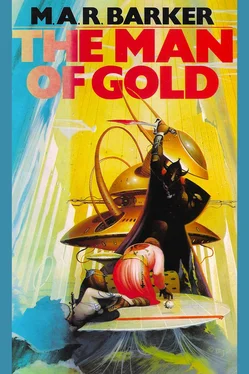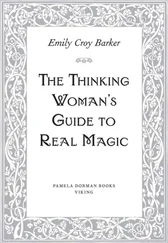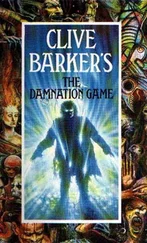M. Barker - The Man of Gold
Здесь есть возможность читать онлайн «M. Barker - The Man of Gold» весь текст электронной книги совершенно бесплатно (целиком полную версию без сокращений). В некоторых случаях можно слушать аудио, скачать через торрент в формате fb2 и присутствует краткое содержание. Жанр: Фэнтези, на английском языке. Описание произведения, (предисловие) а так же отзывы посетителей доступны на портале библиотеки ЛибКат.
- Название:The Man of Gold
- Автор:
- Жанр:
- Год:неизвестен
- ISBN:нет данных
- Рейтинг книги:3 / 5. Голосов: 1
-
Избранное:Добавить в избранное
- Отзывы:
-
Ваша оценка:
- 60
- 1
- 2
- 3
- 4
- 5
The Man of Gold: краткое содержание, описание и аннотация
Предлагаем к чтению аннотацию, описание, краткое содержание или предисловие (зависит от того, что написал сам автор книги «The Man of Gold»). Если вы не нашли необходимую информацию о книге — напишите в комментариях, мы постараемся отыскать её.
The Man of Gold — читать онлайн бесплатно полную книгу (весь текст) целиком
Ниже представлен текст книги, разбитый по страницам. Система сохранения места последней прочитанной страницы, позволяет с удобством читать онлайн бесплатно книгу «The Man of Gold», без необходимости каждый раз заново искать на чём Вы остановились. Поставьте закладку, и сможете в любой момент перейти на страницу, на которой закончили чтение.
Интервал:
Закладка:
“The Ever-Glorious and Most Puissant-three characters I do not know-Empire of Llyan, God — King, Ruler of Tsamra, and- another glyph I cannot read-Master of-hmm-and Holder of the Power of-” he paused and finished on a questioning note, “-the Man of Gold?”
As he looked up his eyes met the hard gaze of the Prior. For a moment the silence held. Then the older man blinked, took the map symbol from Harsan’s hand, and said, “There is more, priest Harsan. -Tell me, is your analysis of the structure of the LIyani language complete?”
Harsan wrenched his attention away from the green-glowing map symbol. “My Lord, it was accepted as my Labour of Reverence. I mean, Lord Thumis deemed it worthy-there are only details… Even now Chushel the Glassmaker blows the final matrices for the elaboration of the syntax…”
“Come, I will look upon it.” Haringgashte rose and slipped knobbly feet into worn sandals of woven reed.
Chapter Three
Prior Haringgashte led the way through the night-shadowed halls of the sleeping monastery to the north wing where the Scholar Priests had their quarters. Beyond this in what was called the New Annex, built half a millennium ago, was the Hall of Mighty Tongues. This was unique to the Monastery of the Sapient Eye, a showplace that even the Temple of Eternal Knowing in Bey Su, the capital, lacked. Many learned pilgrims made the detour from the north-south Sakbe road to trudge up into the foothills and gaze up the marvels wrought by Thumis’ priests. Here, in keeping with the Tsolyani love of depicting everything visually, the Scholar Priests had striven to reduce the complex patterns of language itself to visible, tangible models, comprehensible to those who had mastered the symbolism.
A single torch guttered in its bracket just within the door of the long L-shaped gallery. Inside in the place of honour stood Vringayekmu’s rendition of the phonology and syntax of Mu’ugalavya, the tongue of Tsolyanu’s mighty rival to the west. Twisting spirals of smoky red glass rose from a foliated plinth of black onyx; these were the features that made up Mu’ugalavyani’s twelve vowels. Farther up, these joined, separated, and joined again with convolutions of emerald, ochre, and violet, representing the consonants and the syllabic patterns of the language. Above this, skeins of other colours of glass, crystal, and precious metals danced in the torchlight; the complexities of the noun system and the Mu'ugalavyani verb. Then, like the boughs of some great petrified crystalline tree, these networks entwined, reached out, met, parted, rose and fell together, branched away, and interlocked far overhead to form the intricate patterns of the syntactic structure. Harsan had learned to read it all, could drink it in through every pore, could almost sense spiritually the final mingling of all of these many strands to form at the very apex of the model the first couplet of the Third Ode of Bi'isumish, the Blind Poet of Ssa'atis:
“Wherefore seekest thou, O sage? Tarry, for lo,
The spring, the autumn, the rains-all come round to thee again.”
Beyond Vringayekmu’s creation stood a massive tower of soft, mottled, green stone, dark velvet, grating pebbles, and thin lacquered strips of Chlen- hide. This was priestess Fssu’uma’s analysis of Ghatoni, the tongue of the fisherfolk who dwelt along the western shores of the northern sea. Its three major dialects were each represented by a towering pinnacle reaching up into the gloom. Still farther down the gallery the long-dead priest Horri’s squat pyramid of black glass, set with winking garnets and looped with silver strands, symbolised the language of Salarvya, the great feudal empire bordering Tsolyanu to the southeast. In spite of his present concerns, Harsan could not help but feel a momentary twinge of envy: how beautifully had Horri treated the two hundred and fourteen conjugations of the obstreperous Salarvyani verb! No pilgrim from Salarvya had ever looked upon this masterpiece without gasping in admiration, and indeed, some scholars had even been known to shed tears before its perfection.
More recent constructions lay around the comer of the room to the left, among them Harsan’s own analysis of Llyani. Now he saw that a stranger sat before his work, crosslegged upon a study-mat. A five-wick oil lamp flickered beside him, washing his right arm and his sharp profile with yellow-ruddy light. It was the messenger.
The Prior stopped before him, sketched a bow of greeting. “Auspicious messenger Kurrune, this is priest Harsan, who made this.”
The man seemed to unfold as he got to his feet. He towered over Harsan by a handspan, yet he was slender as a new sapling, fine-boned, of early middle years, with the axe-edged features of eastern Tsolyanu and the indefinable air of the far traveller about him. Now he wore a grey guest-robe of the monastery. His blue courier’s headdress lay beside him upon the flagstones.
“I greet you, priest Harsan. I was pondering your creation.” His voice was deep, grave, and slow. Harsan recognised the flat accent as belonging to the desert city of Fasiltum in the northeastern comer of Tsolyanu.
“It is insufficient, my Lord.” Indeed, Harsan’s truncated pillar of amber and gold filigree could never match the glory of Vringayekmu’s creation nor even the slighter work of Fssu’uma. Too little was known; there were too few sources, no living speakers of Llyani. The curving, spiralling filaments were bare, deficient in detail. The model’s amber spheres were simple, lacking the nuances of curve, colour, and texture which should have revealed the inner systems of the language: the relationships of its grammar and syntax to its semantics and thence to a depiction of the Llyani world-view. To the practiced eye the model was a good yet introductory sketch, clearly the work of a student, albeit one whose insights showed promise.
The messenger paced slowly around the construction, looking, feeling, touching, gently rubbing. The smooth warmth of the amber and the russet-yellow highlights of the dark gold seemed to fascinate him. He paused finally before the two priests.
This was no unlettered bearer of messages. Harsan ventured, “My Lord, you comprehend…?”
The other gave him a slight smile. “Who I am concerns you not. What you have made here does concern me. You may address me as Tusmiketlan, the ‘You of Polite Anonymity.’ In return I shall call you Tusmingaru, the ‘You of Honourable Youth.’ Let me look upon the creator of this work.”
The messenger bent and lifted the lamp. Its light revealed a serious-appearing young man attired in the knee-length grey kilt, stiffened Firya — cloth collar, and reed sandals of a junior priest of Thumis. Harsan was perhaps twenty years of age, slim of build, yet clearly strong as a new tent-rope is strong, with light coppery-gold skin, high cheekbones set in a sharply triangular face, perhaps a bit over-long in the jaw, eyes set a trifle aslant above a typical Tsolyani eagle nose, yet with the wide and generous mouth of the peoples of the western Empire. Harsan’s brows were now a straight line of furrowed puzzlement beneath his cap of black hair.
Kurrune considered. It was clear that the boy had not yet so totally committed himself to the temple as to shave his head and don the black skullcap. Two braids hung down to Harsan’s collar in front of his ears, their ends caught up with twists of silver wire, and the hair at the back of his head was cut to three fingers’ length, all in the rural fashion of the Chakas. A rustic. Yet a young man with talent-and some burgeoning skill.
The messenger nodded and turned to the Prior. “Have you shown him the object I brought?”
“I have. He read most of the inscription.”
“Then I shall show him another item.” The courier took something from a wallet at his belt, unwrapped it, and held it out to Harsan.
Читать дальшеИнтервал:
Закладка:
Похожие книги на «The Man of Gold»
Представляем Вашему вниманию похожие книги на «The Man of Gold» списком для выбора. Мы отобрали схожую по названию и смыслу литературу в надежде предоставить читателям больше вариантов отыскать новые, интересные, ещё непрочитанные произведения.
Обсуждение, отзывы о книге «The Man of Gold» и просто собственные мнения читателей. Оставьте ваши комментарии, напишите, что Вы думаете о произведении, его смысле или главных героях. Укажите что конкретно понравилось, а что нет, и почему Вы так считаете.











